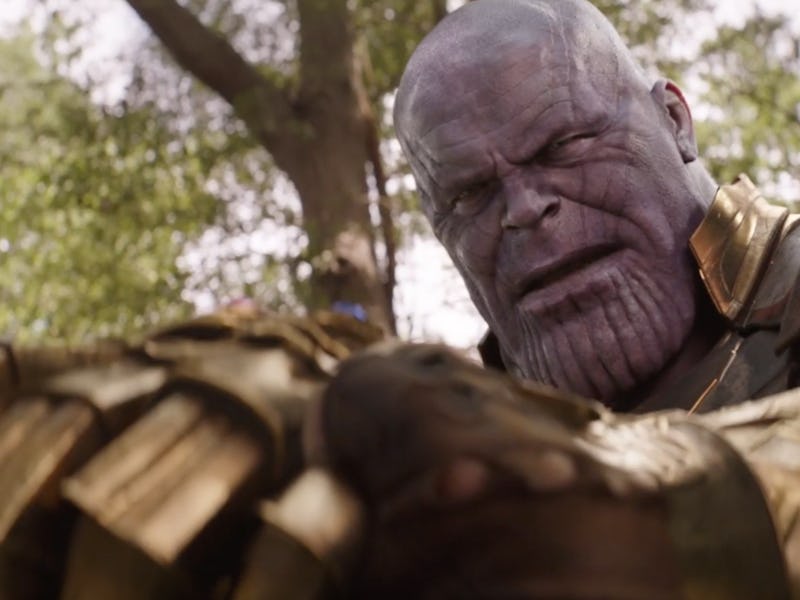Thanos in 'Infinity War' Is the Culmination of 10 Years' Worth of Bad Dads
Bad fathers and father figures are everywhere in the MCU.

Marvel Studios talks about Avengers: Infinity War as a cinematic accomplishment 10 years in the making, but is there any cohesive “point” these 19 films? The Avengers team up every few movies to fend off each new threat, but what does it all mean? Thanos’s assault on Earth in Avengers: Infinity War is the culmination of ten years worth of stories, but it’s also the pinnacle of a key MCU theme that’s been present in almost every movie along the way. The Marvel Cinematic Universe thus far is a decade worth of stories about Bad Dads.
Here comes Thanos, the Baddest Daddy of them all, who literally wants to kill half the universe just to stop sentient existence from consuming itself. He’s a father who thinks he knows better, that by seizing power he can exert his will on his domain, wiping out half of existence in a utilitarian show of what he probably consider benevolence. He probably considers it just punishment for everything all these species have done.
Thanos in 'Avengers: Infinity War' is a bad dad!
Infinity War makes a point to remind us that Thanos has plenty of “Children” of his own, and each of them has been twisted into some being fashioned to serve his needs. We’ve known Gamora and Nebula since Guardians of the Galaxy Vol. 1 (2014), and the latter has ambitions of killing Thanos because he tortured her and replace her body with various cybernetic parts. But Infinity War adds the Black Order to the mix, four more “Children” that Thanos manipulated and abused into becoming his private group of assassins.
Poor Loki, who’s never really fit in anywhere, never truly got his father Odin’s approval; most psychoanalysts might rationalize that’s what drove him to Thanos, seeking approval and love instead of power and misery. In Infinity War, most people think he’ll wind up killed by Thanos in the first five minutes.
Loki gives Thanos the Space Stone during 'Avengers: Infinity War' but will he live long enough to regret it?
As far back as Iron Man (2008), most of these stories have focused on the abuse that fathers inflict upon their kids and how corrupt father figures cause problems for everyone in this entire universe.
Tony Stark’s always had daddy issues, and he went on to infuse all these stories with his own problems. Age of Ultron dramatizes in curious fashion the self-destructive nature of the Avengers, how Tony Stark and Bruce Banner together birthed their own worst enemy in Ultron. Then each of them played a hand in creating Vision as a flawed antidote. Rather than stalwart heroes, the Avengers instead then become — by Civil War — the superhero team equivalent of an ouroboros, a snake eating itself.
Fatherhood has always been a touchstone for the many character conflicts throughout these movies, with a special emphasis in Phrase Three driving right up to Infinity War.
Guardians of the Galaxy Vol. 2 saw Star-Lord struggle to reconcile his identity with that of his egomaniac father, conveniently named Ego. The villain of Spider-Man: Homecoming — Vulture — is a misguided father trying to provide for his family in an unfair world. And who is Tony Stark to Peter Parker if not a problematic father figure that can’t relate to a son that only aims to please? Most recently, Thor: Ragnarok and Black Panther gave us princely sons punished by their fathers’ sins as both Thor and T’Challa struggled to redefine their royal legacies. It’s a brilliant stroke of irony that by the end of Infinity War, they could both lose everything. (Thor almost definitely will.)
Thanos and Gamora in some kind of flashback during 'Avengers: Infinity War'.
So when people talk about Infinity War as the culmination of ten years worth of stories, think about how Thanos’s status as a father influences his choices, and how all the fathers and father figures across the MCU define this universe not by their successes, but by their failures. If good storytelling is about conveying universal truths, then what’s more effective than a giant purple bald man who’s the baddest daddy of them all?